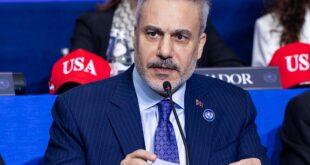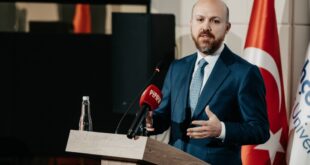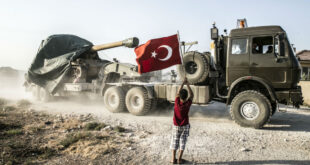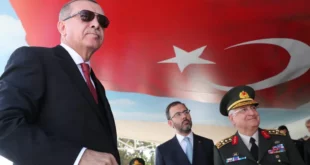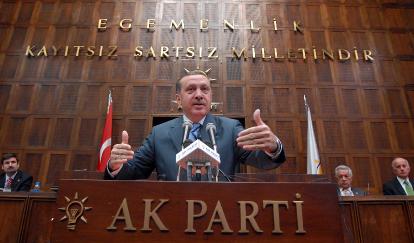 Turkish Prime Minister Recep Tayyip Erdoğan, who hosts the International Monetary Fund/World Bank annual meeting, wants to show that his $600 billion economy can survive the global crisis without IMF money.
Turkish Prime Minister Recep Tayyip Erdoğan, who hosts the International Monetary Fund/World Bank annual meeting, wants to show that his $600 billion economy can survive the global crisis without IMF money.
Turkey has been the fund’s biggest borrower this decade, drawing about $43 billion to help recapitalize more than 20 failed banks. Erdoğan, who heads a government that has been entrenching its power since a 2007 re-election, has resisted taking on new loans in more than a year of talks with the fund, even as the EU membership candidate sank into its deepest recession.
“Erdoğan consistently said ‘no’ to the IMF, despite pressures from both the domestic and the overseas business community,” said Ahmet Akarlı, an economist for Goldman Sachs Group in London. He likely saw dependency on IMF loans as incompatible with his “strategy of transforming Turkey into a leading global player and a heavyweight in its immediate region,” Akarlı said.
Turkish financial markets backed Erdoğan’s go-it-alone strategy, posting gains even as Turkey refused IMF requests to reduce spending on local government and improve the country’s tax collection system.
Turkey’s benchmark IMKB-100 stock index has added about 80 percent this year, exceeding the 57 percent gain on the benchmark MSCI Emerging Markets index. Yields on the country’s benchmark bonds have fallen by almost half, to a record low of 8.6 percent.
Publicity coup:
The IMF and World Bank meetings are only held outside Washington once every three years and Turkey, venue for the 1955 summit, becomes the first country to host them twice – a publicity coup for Erdoğan and his Justice and Development Party, or AKP.
The IMF meetings “will take Turkey’s visibility to new levels,” Deputy Prime Minister Ali Babacan said on Sept 30.
Erdoğan inherited an IMF program of spending cuts and state asset sales when he came to power in 2003, and stuck with it for five years. Now he’s balking at the fund’s demands for tighter budgets, and says Turkey no longer needs IMF cash.
“We’ve shown we can overcome crisis without the IMF,” he said on Sept. 17 in Istanbul, the city he ran as mayor between 1994 and 1998. “We’re trying to stand on our own two feet and move forward without a walking stick.”
Talks will resume once the annual meetings end, “and we’ll see what is needed,” fund Managing Director Dominique Strauss-Kahn said Thursday in Istanbul. “There’s no rush and no tension between Turkey and the IMF.”
The country’s banking system has weathered the global crisis without the need for government bailouts, after a decade of IMF-ordered changes to tighten regulation and risk management. Akbank, the lender part-owned by Citigroup, stayed profitable throughout the crisis and posted second-quarter net of $494 million, up 44 percent from a year earlier.
Turkey’s manufacturing economy, though, is limping its way through the global slowdown, as European demand for Turkish-made cars, fridges and washing machines slumps. Net income at Ford Otomotiv Sanayi, the local unit of Ford Motor, fell 35 percent in the second quarter as exports slumped.
Gross domestic product dropped an annual 14.3 percent in the first quarter, the deepest contraction since quarterly records began in 1987. Unemployment among people under 24 jumped to 29 percent in February from 22 percent a year earlier.
Criticism from top businessman
The economy would have performed better if Erdoğan had agreed IMF loans, Mustafa Koc, chairman of the country’s biggest industrial group Koç Holding, said in Istanbul Thursday.
Higher spending to support the jobless, combined with lower tax revenue, is forcing the government to borrow more to fund a budget deficit forecast at 63 billion Turkish Liras ($43 billion) this year, six times the target drawn up before the crisis struck.
That means Erdoğan can’t cut off talks with the fund altogether. The country still owes about $8 billion to the IMF from earlier programs.
“They’ll keep the IMF talks in limbo for a while longer because that’s worked so far,” said Tevfik Aksoy, an economist at Morgan Stanley in London. “If global conditions worsen and it looks like there may be a need for money after all, then they’ll be able to announce it.”
 Eurasia Press & News
Eurasia Press & News
